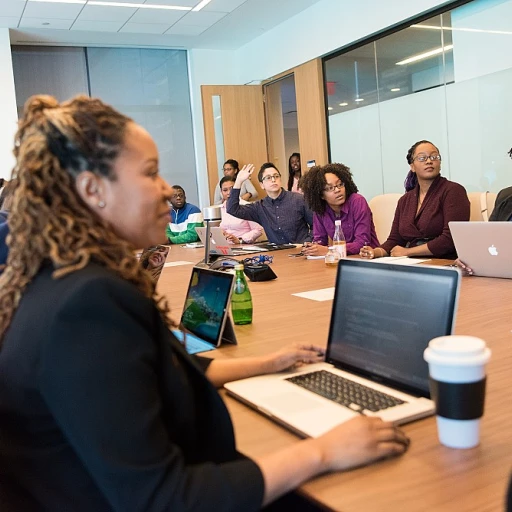
Understanding the Chief People Officer's Influence
The Impact of Leadership in Shaping Employer Branding
The role of a Chief People Officer (CPO) is increasingly pivotal in modern organizations. It's not just about managing human resources or employee engagement. Today’s CPOs, often in collaboration with other senior leaders, are integral to shaping the business's direction and culture. They wield significant influence in crafting an appealing employer brand that aligns with the company's long-term vision and strategic goals. In many companies, the Chief People Officer acts as a bridge between employees and the upper management, enabling smoother communication and alignment of goals. This position is essential for deploying successful people strategy initiatives that resonate across all levels of the organization. The objective is to foster very strong employee experiences, thereby improving employee engagement and satisfaction. Moreover, the CPO's leadership extends into areas such as talent management and succession planning. By focusing on leadership development, CPOs ensure that the organization is not only staffed with capable talents today but also ready to face future challenges. As CPOs lead these initiatives, they reinforce the company culture and values, establishing a coherent identity that attracts and retains top-tier talent. A strong ability to leverage resources effectively allows CPOs to drive significant business outcomes. Officer chiefs are increasingly involved in strategic decision-making processes, an evolution from previously limited roles. This transformation underscores the necessity for CPOs to continually adapt and grow, ensuring they remain influential players in shaping the company's narrative. Understanding the importance of the Chief People Officer in an organization is crucial, especially in shaping and maintaining the employer brand. The CPO role is more significant than ever, reflecting a broader trend where organizations seek leaders who can steer people strategies adeptly. Explore more about the vital role of human resource managers in shaping employer branding in our related article.Integrating Employer Branding with Corporate Strategy
Aligning Employer Branding with Overall Business Goals
For the Chief People Officer (CPO), aligning employer branding with the overarching corporate strategy is essential. As leaders within the organization, CPOs must understand the business objectives and translate them into effective people strategies that resonate throughout the employee experience. This alignment ensures that the workforce is not just seen as a resource but as a crucial driver for success.
Employer branding is not just about external perceptions but also about internal coherence. A strong company culture requires the role of the CPO to emphasize a shared vision that ties back to the company's mission. This fosters a sense of belonging among employees, enhancing employee engagement and enhancing talent assessment efforts across the board.
Strategic Decision Making with Leadership
CPOs must work closely with other leaders within human resources and beyond. This involves making informed decisions by employing data analytics and human insights, reinforcing the business’s strategic direction. An officer chief has the unique position to influence these decisions through comprehensive human resource management and talent acquisition strategies aimed at long-term organizational growth.
Successful employer branding initiatives are deeply intertwined with leadership development and succession planning. By prioritizing these areas, the organization positions itself not only as a great place to work but also as a talent magnet for top-tier candidates, ensuring a sustainable pool of leaders for the future.
Leveraging Technology and Data Analytics
Utilizing Technology and Data for Strategic Advantages
Modern Chief People Officers (CPOs) have embraced technology and data analytics as indispensable tools to enhance their employer branding strategies and decision making processes. As organizations continually strive to attract and retain top talent, leveraging these resources becomes crucial in redefining the CPO role and aligning it with overarching business goals. One significant advantage of utilizing technology and data analytics is the ability to gather valuable insights into employee engagement, talent acquisition, and workforce behavior. These insights not only inform leadership development and management strategies but also help in succession planning and fostering a positive employee experience. By analyzing data, companies can identify patterns and trends that enable more effective people strategy planning and talent management. Additionally, technology platforms have streamlined processes for enhancing the company culture and employee engagement. Tools that offer real-time feedback facilitate open communication within the organization, bolstering employee involvement and satisfaction. In this way, technology aids in crafting a work environment where the workforce feels valued and engaged, aligning with the chief human resources officer’s mission of nurturing an inclusive company culture. The integration of technology in human resources is also revolutionizing practices such as recruitment, where data-driven approaches to talent acquisition are gaining traction. For instance, monitoring candidate engagement patterns and utilizing AI-driven platforms for screening can enhance hiring efficiency. By incorporating these innovative practices, CPOs can boost the organization’s employer branding, thereby differentiating the company in a competitive market. In conclusion, the marriage between technology and strategic human resources management plays a pivotal role in shaping the future of employer branding. By harnessing data analytics and technological advancements, companies are better positioned to support and implement sustainable, long term successful employer branding strategies. For more insights into how organizations are leveraging these strategies effectively, see Exploring the human resources strategies at Viking Cruises.Fostering a Culture of Inclusivity and Diversity
Promoting Diversity and Inclusivity as Core Values
In the current business landscape, bolstering inclusivity and diversity within an organization is no longer an option; it’s a necessity. People officers are at the forefront of this shift, guiding companies to embed these core values within their employer branding strategies. A company's culture, defined by its diversity and inclusivity commitments, increasingly influences talent acquisition and employee retention. As leaders in the workplace, Chief People Officers (CPOs) are uniquely positioned to spearhead initiatives that cultivate an inclusive company culture, impacting both current employees and potential recruits. Fostering inclusivity and diversity starts with leadership commitment. The role of a CPO is to ensure that diversity initiatives are not mere checkbox exercises but ingrained in the company’s DNA. This requires crafting policies and strategies that eliminate unconscious biases and promote equal opportunities. Furthermore, a comprehensive inclusivity approach enables CPOs to pursue a more diverse talent pool, ensuring varied perspectives that contribute to well-rounded decision making. By integrating inclusive practices, CPOs promote an employee experience that values authenticity and open communication within the workforce.Cultivating an Inclusive Workplace Environment
Critical to advancing a culture of inclusivity is actively involving employees in the conversation. CPOs should leverage their positions to create platforms for employee engagement, allowing team members at all levels to contribute ideas on diversity. Initiatives might include forums, workshops, or feedback sessions that reinforce an inclusive environment where all voices are heard. Effective people management also means refining talent management processes to embrace diversity from succession planning to leadership development. A focus on inclusivity demands a shift in perspective, seeing diversity as a strength that enriches the organization’s narrative and impacts long-term success. Whether adapting to remote work models or integrating employer branding with corporate strategies, the message remains clear – CPOs must champion inclusivity and diversity to foster a thriving workplace culture that attracts and retains top talent.Adapting to Remote and Hybrid Work Models
Embracing Change in Workforce Structures
The dynamic evolution of work paradigms, notably the rise of remote and hybrid models, is reshaping the landscape of talent management and organizational culture. As businesses pivot towards these models, the role of the Chief People Officer (CPO) becomes increasingly pivotal. Utilizing their expertise in human resources, people officers are tasked with reinventing the approach to employee engagement and culture cultivation in a virtual environment. Implementing successful remote and hybrid work strategies requires careful consideration of several factors:- Clear and Open Communication: Ensuring transparent communication channels is essential. Employees thrive in environments where leadership facilitates open dialogues and decisions are made with clarity. This becomes crucial in remote setups where the risk of miscommunication can be higher.
- Maintaining Employee Engagement: Engagement strategies need to adapt to cater to remote employees. Initiatives could range from virtual team building activities to innovative rewards systems that recognize and appreciate employee contributions, fostering a sense of belonging.
- Flexible Policies and Practices: Flexibility in policies and work practices helps accommodate the diverse needs of a distributed workforce. Chief people officers need to guide organizations in crafting policies that support a work-life balance while still aligning with corporate objectives.
- Investment in Technology and Tools: Leveraging technology to facilitate collaboration and communication is fundamental. CPOs can play a strategic role in selecting the appropriate tech solutions that enhance productivity and connectivity.













